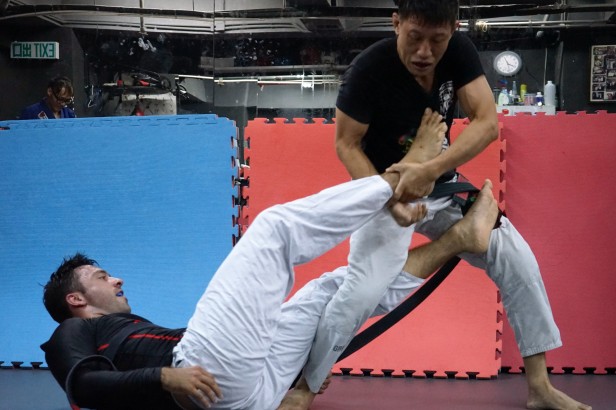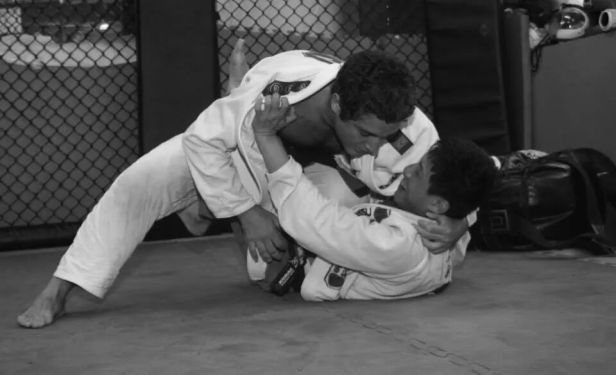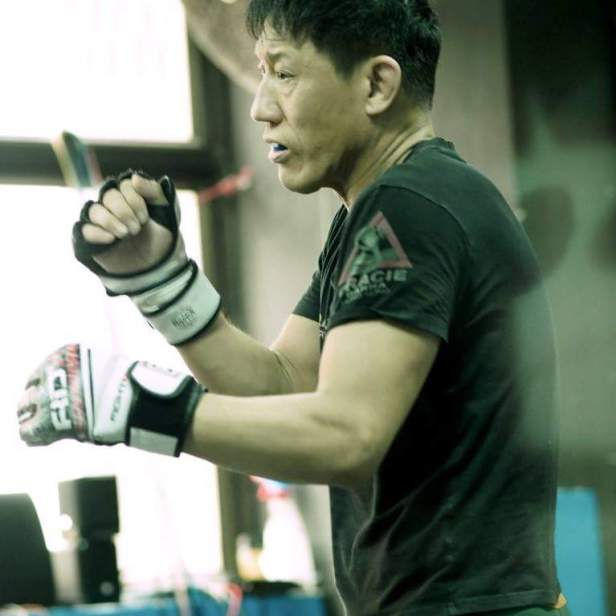Eras come and go, and the Hong Kong fight scene has weathered plenty of styles and preferences throughout the years. Many martial arts gyms in Hong Kong have failed to withstand the harsh winds and violent weathers of the business world as more trendy styles take over.
Fight Club Hong Kong is probably one of the, if not the oldest Brazilian Jiu-Jitsu gym in Hong Kong. Started in 2004, and at that time only a partition of an office, its fight life was nurtured by Henry Chan – martial artist, entrepreneur and engineer.
Despite the tender age of Fight Club, you will be astonished to find that Henry is brilliantly young (in heart). Turning fifty-four next February, Henry has spent his lifetime devoted to martial arts since fifteen years old.
Henry first started Karate to protect himself from bullies whilst studying abroad in England. He first followed instructions from a book titled “This is Karate” by Mas Oyama.
He eventually picked up Judo, and when he was twenty-three, he participated in University Judo Competition and achieved third place. He also fought a few boxing competitions but returned to Hong Kong when he was twenty-four.

He started competing Karate and made it to the National Team when he was twenty-eight and won the Goju Kai Champion at twenty-nine. Henry carried on competing in a few full contact Karate rule competitions but sustained injury to his left knee during competition in Japan when he was thirty-six. At forty-one, Henry sustained a serious injury to his left Achilles and stopped all forms of competition.
Henry was also forced to stop all forms of standing up training but this didn’t stop Henry from practicing martial arts. He remembered he had watched an event called the Ultimate Fighting Championships (it was UFC 3, fought on 9th September 1994) where people would compete bare knuckle with no rules. And this was where he watched Royce Gracie (175lbs) defeat Kimo Leopoldo (250lbs) via an armbar submission.
This sparked Henry’s interest in Brazilian Jiu Jitsu (BJJ), but as sources were limited back in 2004 and because BJJ was practically unheard of in Hong Kong, he struggled to advance in the sport.

Henry invited many guests to help him improve his skill set in BJJ. At first, there was Professor Marco Joca from Gracie Barra, and subsequently, he invited Professor Chet Quint from Beijing to come every three months to stay for a week. This lasted for one and a half years, and then Professor Daniel Charles Pereira from Nova União arrived. Ever since, Professor Daniel has been with fight club.
In 2013, Henry decided participate in the World Masters Tournament but due to yet another injury during a training session, he was unable to compete.
In 2014, at age fifty-one, Henry received his black belt from Professor Daniel Charles Pereira.
A lot of skilled and famous visitors such as Eduardo Telles, Carlson Gracie Junior, Clark Gracie and Michelle Nicolini have come to visit and teach at Fight Club throughout the years.
Henry’s dedication to the sport is surreal. There is barely a day in life that he does not train, Monday through Sunday. Henry has trained hundreds of students and you will most likely find him at Gracie Barra Hong Kong / Fight Club Hong Kong in Wanchai on any given day.

TAKEAWAY QUESTIONS:
FightlifeHK: How often do you train?
Henry: “Ever since I started training at fifteen, my entire life has been about training. The only time I’m not training is when I’m sleeping. When I wake up in the morning, I will stretch while I am brushing my teeth. When I am waiting for the lift, I like to hit the wall to strengthen my knuckles. Whilst many people choose to use the escalator, I enjoy walking up the stairs. When I carry out inspection whilst I do my job, I tread the dangerous hillside and natural terrain.”
“I train whenever I can. Teaching to me is also part of training. I never stop learning. I learn from many different Sifus, I train various styles to diversify my knowledge in martial arts. All my time devoted to self expanding and teaching.”
“To me, training doesn’t only solely happen in the gym or mat. It happens everywhere.”
FightlifeHK: Do you find it hard to toggle between family, work and martial arts? How do you solve the balance equation?
Henry: “This was never a problem. To me, if you want to do something, you will find a thousand reasons to back you up. On the contrary, if you don’t want to do something, you can still find a thousand reasons to turn it down. Integrate martial arts into your life and it would never be a problem.”
FightlifeHK: You have many students now. Do you think everyone has an equal chance to compete?
Henry: “Equal chance, depends on how you see things as equal. And what you mean by chance. To me, nothing is equal. You shouldn’t expect anything is equal in the first place. Chance is only opportunities for those who are well prepared at all times.”
FightlifeHK: How long do you recon it would take for a normal person to compete?
Henry: “Look, competition is only a small part of your journey. If you only train to compete, you will stop training very soon. Having said that, you shouldn’t be afraid of entering competitions. Competition is a tool to help you to overcome yourself and to understand yourself better. Compete while you are young, so you will never regret that you have not done so when you turn old. But martial arts is life, it has lots more to offer than competition.”
FightlifeHK: What if a student fails, how would you help them?
Henry: “You never fail, you only learn. I keep on preaching this philosophy to my students on and off the mat. This is life and such is life.”
FightlifeHK: Can you think of any challenges you faced in martial arts? What do you still want to achieve in this art?
Henry: “I don’t see my obstacles as a challenge. However, you could say trying to keep evolving is challenging. Especially, when you are stuck within a shell of a single style. Never stop evolving, never stop learning. Open your mind to take in what you feel can make yourself more all rounded and better as a whole.”
“Martial Art is a lifetime journey and a lifestyle. My sole goal is to a better self than whom I was yesterday.”



